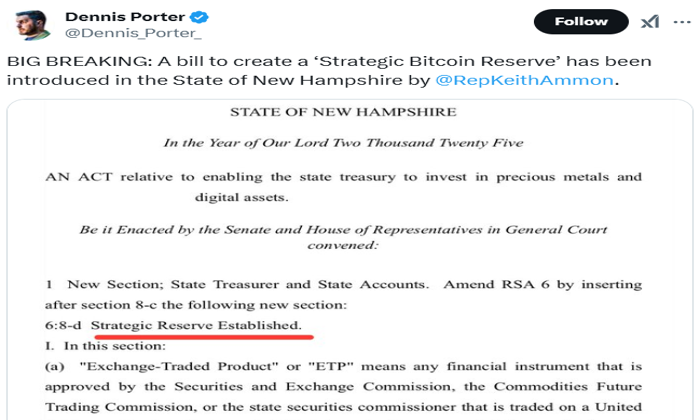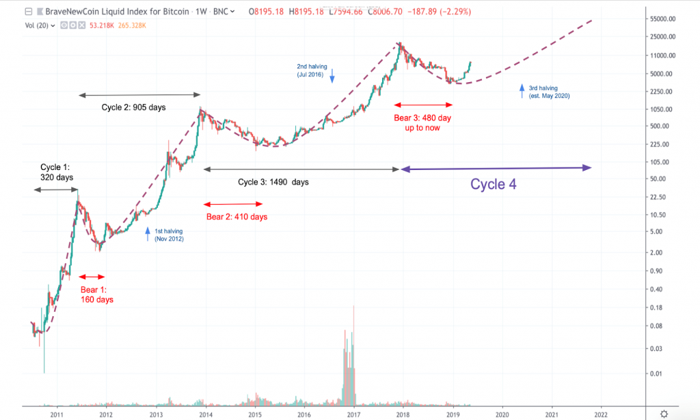New Hampshire is making headlines as it becomes the first state to enact a pioneering crypto reserve law, approved by Governor Kelly Ayotte. This new legislation allows New Hampshire to invest a portion of its public funds into crypto assets, specifically permitting up to 5% allocation in Bitcoin, a strategic move that aligns with modern crypto investment law trends. As states across the nation grapple with similar initiatives, New Hampshire stands out not only for its foresight in public funds crypto investment but also for setting a precedent that may influence digital assets legislation across the United States. With this groundbreaking decision, New Hampshire is positioning itself at the forefront of cryptocurrency reserve strategies, capturing the attention of investors and policymakers alike. Governor Ayotte’s endorsement of this innovative approach underscores the state’s commitment to embracing the future of finance through a robust Bitcoin reserve framework.
In a bold step towards integrating digital currencies into state finance, New Hampshire’s new law facilitates the investment of state assets in digital currencies, ushering in a new era of financial innovation. By establishing guidelines that permit a tactical allocation to Bitcoin, this legislation positions the state as a leader in digital asset integration within public finance. The measure reflects a growing acceptance of cryptocurrencies as legitimate components of investment portfolios, mirroring global trends toward digital assets. As the first U.S. state to launch such an initiative, New Hampshire might inspire other jurisdictions to consider similar measures, potentially reshaping the landscape for public funds in cryptocurrencies. This legislative victory not only enhances the state’s financial agility but also sets the stage for imminent growth in digital investment opportunities.
The Significance of New Hampshire’s Crypto Reserve Law
New Hampshire’s recent approval of the crypto reserve law marks a significant milestone in the world of digital assets legislation. By allowing up to 5% of public funds to be allocated to cryptocurrencies like Bitcoin, the state positions itself as a pioneer among U.S. states. This groundbreaking legislation reflects a growing recognition of the potential benefits of integrating cryptocurrencies into traditional state financial frameworks. After setbacks faced by other states like Arizona and Florida, New Hampshire’s proactive approach could inspire a wave of similar legislative efforts across the country.
The implications of New Hampshire’s crypto reserve law extend beyond mere financial investment. It symbolizes a shift in the perception of digital assets, moving away from skepticism towards a more embracing attitude. This move could set a precedent for other states to follow, essentially fostering a competitive environment that encourages innovation in public fund management. By taking this bold step, New Hampshire distinguishes itself as a leader in the emerging landscape of crypto public finance.
Current Trends in Crypto Investment Law Across the United States
As the landscape of crypto investment law evolves, states are increasingly exploring the integration of digital assets within their financial systems. New Hampshire has become a trailblazer in this regard, having approved its crypto reserve law amidst a backdrop of challenges in other states. While Arizona and Florida grapple with legislative obstacles, New Hampshire has successfully navigated these waters, laying a strong foundation for public funds in crypto investments. This trend highlights a significant shift in how state governments are approaching the opportunities presented by digital currencies like Bitcoin.
The emergence of crypto investment laws across various states illustrates a growing acceptance of digital assets as legitimate investments rather than speculative ventures. States are beginning to realize the potential revenue streams that can be generated from crypto reserves, leading to an increased push for legislative changes. As public funds enter the crypto space, this not only legitimizes the assets themselves but also positions states to benefit from the anticipated growth of the cryptocurrency market.
The Role of Bitcoin in New Hampshire’s Crypto Reserve Strategy
Bitcoin’s inclusion as the sole qualifying asset in New Hampshire’s crypto reserve law underscores its status as a dominant player in the cryptocurrency market. With a market capitalization exceeding $500 billion, Bitcoin stands as a robust option for states looking to diversify their public funds. The strategic decision to invest in Bitcoin highlights not only its perceived stability among cryptocurrencies but also reflects confidence in its long-term growth potential. New Hampshire’s choice to focus on Bitcoin rather than a broader array of digital assets could set a precedent for how other states approach crypto investments.
This focused strategy positions New Hampshire to harness the power of Bitcoin as it continues to gain traction among institutional investors. By establishing a Bitcoin reserve, the state not only aims to capitalize on potential returns but also hopes to enhance its financial stability in an increasingly volatile economic landscape. As more states consider similar legislative paths, New Hampshire’s Bitcoin-centric approach may serve as a model for integrating cryptocurrencies into public fund management.
Exploring Digital Assets Legislation Trends Nationwide
The landscape of digital assets legislation in the United States is rapidly evolving, with states scrambling to set frameworks that allow for the investment of public funds in cryptocurrencies. New Hampshire’s proactive approach to establishing a crypto reserve law signals a broader acceptance of digital assets. By creating a path for public investment in cryptocurrencies, New Hampshire has ignited discussions in legislative chambers nationwide, enticing other states to consider similar measures amid growing fiscal pressures.
Despite some setbacks experienced by other states, such as Florida’s retracted initiatives and Arizona’s legislative vetoes, the push for digital assets legislation is gaining momentum. Lawmakers recognize the potential of public funds crypto initiatives as a means to diversify state revenue streams and adapt to an evolving financial environment defined by technological advancement. The ongoing dialogue surrounding digital assets legislation indicates that jurisdictions are keenly aware of the importance of having a strategic framework for engaging with cryptocurrencies.
Potential Economic Benefits of New Hampshire’s Crypto Reserve Law
New Hampshire’s pioneering crypto reserve law not only positions the state at the forefront of digital asset legislation but also suggests potential economic benefits from such an investment strategy. By allocating public funds to Bitcoin, the state opens up avenues for increasing revenues through capital appreciation. As the cryptocurrency market matures, New Hampshire could benefit from early adoption, creating a positive impact on its fiscal health and allowing for better public service funding and infrastructure development.
Moreover, the law might encourage innovative startups and blockchain companies to establish themselves in New Hampshire, enhancing the state’s reputation as a hub for tech innovation. As digital assets and cryptocurrencies gain traction, having a supportive legislative framework might attract entrepreneurs looking for states conducive to crypto-related business activities. This influx of innovation could create jobs and stimulate local economies, showcasing how strategic investments in digital assets can yield significant long-term benefits.
Public Perception of Crypto Assets in New Hampshire
The passage of New Hampshire’s crypto reserve law signifies not only a legislative victory but also a shift in public perception towards cryptocurrencies. Historically viewed with skepticism, digital assets are increasingly being recognized for their potential to provide viable investment opportunities. As state officials advocate for integrating Bitcoin into public funds, the general public’s understanding and acceptance of crypto assets may also begin to evolve. This transformation can promote further interest and engagement, ultimately leading to increased investment in the field.
Furthermore, as New Hampshire leads the way in crypto legislation, public sentiment may shift favorably toward the innovation surrounding blockchain technology. Residents could become more willing to explore the possibilities inherent in digital currencies. Enhanced education and outreach efforts accompanying the new law will also play a pivotal role in demystifying cryptocurrencies and fostering an informed community ready to engage with these digital assets responsibly.
Challenges Faced by Other States in Implementing Crypto Asset Reserves
While New Hampshire has successfully enacted its crypto reserve law, other states continue to face challenges when attempting similar initiatives. For example, Arizona’s earlier proposal was met with a veto from the governor, stalling momentum and leading to uncertainty among legislators and advocates of public funds in crypto. Florida also experienced setbacks, casting doubt on the viability of crypto reserves in the immediate future. These challenges highlight the complexities of adopting digital asset legislation within the existing framework of public finance.
The difficulties encountered by these states often stem from a lack of understanding about cryptocurrency’s implications and potential risks associated with investing public funds in volatile markets. Furthermore, concerns about regulatory compliance, security, and the long-term sustainability of digital assets complicate legislative efforts. As states observe New Hampshire’s progress, they may be encouraged to streamline their own approaches and address the legislative hurdles preventing them from establishing similar frameworks.
The Future of Crypto Reserves in U.S. State Governments
As New Hampshire leads the charge in adopting a crypto reserve law, it raises the question of what the future holds for U.S. state governments considering digital asset investments. The successful implementation of such legislation could catalyze a chain reaction as legislators in other states recognize the potential advantages of diversifying state investment portfolios with cryptocurrencies. This adoption may lead to a shift in the narrative surrounding the legitimacy of digital assets, encouraging more states to pursue similar legislative measures.
Furthermore, as more states embrace crypto reserves, there may be a growing demand for comprehensive regulatory frameworks to govern such investments. States will likely need to collaborate on establishing standards and best practices to ensure transparency, security, and accountability in managing public funds invested in cryptocurrencies. The ongoing discussion regarding crypto policy among various stakeholders, including state legislators, financial institutions, and crypto advocates, will play a critical role in shaping how these future legislative efforts unfold.
Implications for Financial Institutions and Traditional Banking
The introduction of New Hampshire’s crypto reserve law carries significant implications for financial institutions and traditional banking systems. As state governments begin to explore the integration of cryptocurrencies into public fund management, banks and financial institutions may need to rethink their approaches to servicing clients involved in digital asset investments. This could lead to a growing demand for innovative financial products and services tailored to the needs of investors in crypto assets and public funds.
Moreover, the movement towards crypto reserves could incite traditional banks to reevaluate their own investment strategies, particularly as more states establish frameworks for public investment in digital currencies. The evolving landscape necessitates that these institutions adapt to remain competitive and relevant, potentially catalyzing partnerships between traditional banking and the burgeoning crypto sector. As the lines between these two worlds begin to blur, both will need to navigate the challenges and opportunities presented by this new financial frontier.
Frequently Asked Questions
What is the New Hampshire crypto reserve law?
The New Hampshire crypto reserve law, signed by Governor Kelly Ayotte, permits the state to invest up to 5% of its available public funds in digital assets like Bitcoin. This makes New Hampshire the first state to establish such a measure, allowing for strategic investment in crypto reserves.
How does the New Hampshire crypto reserve law benefit public funds?
The New Hampshire crypto reserve law allows state officials to diversify public funds by investing in crypto assets. This can potentially enhance returns, particularly with asset growth in Bitcoin, which is currently the primary qualifying digital asset under the law.
Can New Hampshire use public funds for crypto investments under the new law?
Yes, under the New Hampshire crypto reserve law, the state can allocate up to 5% of public funds to cryptocurrency investments, specifically targeting digital assets with a substantial market capitalization, like Bitcoin.
What criteria must crypto assets meet under New Hampshire law?
To qualify for investment under the New Hampshire crypto reserve law, a cryptocurrency must have a market capitalization of at least $500 billion, currently applicable to Bitcoin only.
Why is the New Hampshire crypto reserve law considered groundbreaking?
The New Hampshire crypto reserve law is groundbreaking because it positions the state as a leader in adopting cryptocurrency regulations, allowing public funds to be invested in digital assets. This legislative move is seen as a significant step toward embracing blockchain technology in public finance.
What impact could the New Hampshire crypto reserve law have on other states?
The New Hampshire crypto reserve law may influence other states to consider similar legislation, as it sets a precedent that could encourage legislative efforts towards adopting public funds in crypto investments.
Is Bitcoin the only digital asset included in New Hampshire’s crypto reserve law?
Currently, under the New Hampshire crypto reserve law, Bitcoin is the only digital asset that qualifies for investment, as it meets the requirement of having a market capitalization of at least $500 billion.
What was the intended purpose of the New Hampshire crypto reserve law?
The intended purpose of the New Hampshire crypto reserve law is to enable the state to strategically invest public funds in cryptocurrencies, potentially increasing state revenue and paving the way for future digital asset legislation.
How does New Hampshire’s crypto investment law compare to similar efforts in other states?
New Hampshire’s crypto investment law stands out as it is the first successful measure passed, while similar proposals in states like Arizona and Florida have faced setbacks and vetoes, showcasing New Hampshire’s pioneering stance on public funds and crypto.
What future implications does the New Hampshire crypto reserve law have for state finances?
The New Hampshire crypto reserve law could lead to innovative financing methods for state budgets, as successful crypto investments might provide additional revenue streams and set a model for fiscal strategies in a digital economy.
| Key Points | Details |
|---|---|
| First State to Approve Crypto Reserve | New Hampshire officially becomes the first U.S. state to allow investment in crypto assets. |
| Governor’s Approval | Governor Kelly Ayotte signed the bill allowing public funds investment in crypto. |
| Investment Limit | The law permits up to 5% of public funds to be allocated to cryptocurrencies, primarily Bitcoin. |
| Legislative Context | Other states, including Arizona and Florida, have faced difficulties in passing similar legislation. |
| Potential Impact | Sets a precedent for other states to consider adopting similar laws for crypto reserves. |
| Political Responses | Support from local Republican lawmakers and advocacy groups for future crypto initiatives. |
Summary
New Hampshire crypto reserve law is significant as it marks the first instance of a U.S. state legally permitting the investment of public funds in cryptocurrencies. This forward-thinking legislation, signed by Governor Kelly Ayotte, allows the state to allocate up to 5% of its available public funds in Bitcoin, paving the way for innovative financial strategies and setting a precedent for other states contemplating similar actions. As New Hampshire leads this initiative, it highlights the shifting landscape of public finance and the growing acceptance of digital assets in traditional investment strategies.
New Hampshire crypto reserve law has marked a significant milestone as the first legislation of its kind approved in the United States, allowing the state to invest a portion of its public funds into digital assets. Signed by Governor Kelly Ayotte, this groundbreaking law permits New Hampshire to allocate up to 5% of its available public funds in Bitcoin, recognizing the growing legitimacy of cryptocurrencies as alternative investments. In an era where many state efforts to legalize crypto investment are stymied by political roadblocks, New Hampshire has boldly taken the lead, showcasing its commitment to innovation in financial strategy. The bill not only positions the state at the forefront of crypto investment law but also hints at a potential ripple effect for neighboring states to follow. As discussions around public funds and crypto intensify, New Hampshire’s proactive approach sets the stage for future developments in digital assets legislation.
The recent enactment of New Hampshire’s new law establishes a pioneering framework for government involvement in cryptocurrency markets. By sanctioning the investment of state resources into Bitcoin reserves, New Hampshire stands as a beacon among states navigating the intricate landscape of public funds allocated for digital ventures. This novel approach not only highlights New Hampshire’s leadership in crypto-related policies but also reflects an evolving attitude toward alternative asset management strategies. As more states contemplate similar actions, the implications of New Hampshire’s precedent could shape public finance and investment paradigms across the nation. In light of this development, many are keenly watching how this legislative breakthrough influences the broader conversation around government engagement with digital currencies.














